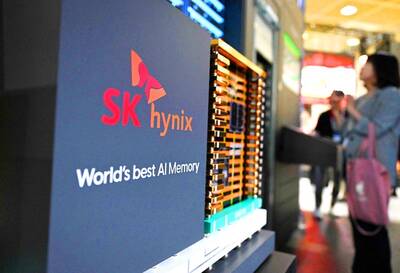Taiwan Semiconductor Manufacturing Co (TSMC, 台積電), the world’s top contract chipmaker, yesterday said its board has approved a plan to sell its unprofitable LED subsidiary to Epistar Corp (晶電) for NT$825 million (US$25.85 million) in cash and exit from the highly competitive LED market.
TSMC will book NT$740 million in losses from selling the LED business, according to a company statement filed with the Taiwan Stock Exchange.
After the transaction is completed, Epistar, the nation’s top LED manufacturer, will hold a 565 million share (94 percent) stake in TSMC Solid State Lighting Ltd (TSMC SSL, 台積固態照明), according to a joint statement. Shares of TSMC SSL are priced at NT$1.46.
The transaction value is much lower than the NT$1.26 billion to NT$1.89 billion share swap Chinese-language Wealth Magazine reported on Dec. 2.
TSMC SSL “has struggled to reach profitability due to oversupply following the massive expansion of the LED industry in the past several years,” TSMC said in the statement. “As a late entrant, TSMC SSL has also faced difficulties overcoming patent obstacles and establishing sales channels.”
TSMC SSL has lost NT$3.65 billion over the past three years since its establishment in 2011, according to TSMC’s annual reports.
Related rules stipulate that the LED company requires an injection of new capital to improve its financial structure, after accumulated losses exceeded 50 percent of the LED company’s share capital of NT$6.01 billion.
TSMC SSL chairman Steven Tso (左大川) said the deal would create a “win-win scenario.”
Epistar has a better patent portfolio from cross-licensing with the world’s major LED companies, which include Philips and Toyoda Gosei, and has deployed a wide network of sales channels across the globe, the statement said.
“TSMC SSL’s capacity might be far less than Epistar, but by working with TSMC we can be introduced to different thinking, talent and systems from across industries to spark new ideas and improve Epistar’s future operations,” Epistar chairman Lee Biing-jye (李秉傑) said in the statement.
The acquisition of TSMC SSL is Epistar’s latest effort to boost its capacity and talent, in an attempt to capture the fast-growing LED lighting market over next three years, following a merger with rival Formosa Epitaxy Inc (璨圓光電) about a month ago, the statement said.
“The merger will significantly help Epistar shrink its learning curve in expanding to make large-size [LED] wafers and will also help the company migrate toward [advanced] wafer-level chip packaging technology,” Joanne Wu (吳盈潔), an analyst with market research house LEDinside, said yesterday.
The deal will also help boost Epistar’s LED chip capacity, Wu said.

Intel Corp chief executive officer Lip-Bu Tan (陳立武) is expected to meet with Taiwanese suppliers next month in conjunction with the opening of the Computex Taipei trade show, supply chain sources said on Monday. The visit, the first for Tan to Taiwan since assuming his new post last month, would be aimed at enhancing Intel’s ties with suppliers in Taiwan as he attempts to help turn around the struggling US chipmaker, the sources said. Tan is to hold a banquet to celebrate Intel’s 40-year presence in Taiwan before Computex opens on May 20 and invite dozens of Taiwanese suppliers to exchange views

Application-specific integrated circuit designer Faraday Technology Corp (智原) yesterday said that although revenue this quarter would decline 30 percent from last quarter, it retained its full-year forecast of revenue growth of 100 percent. The company attributed the quarterly drop to a slowdown in customers’ production of chips using Faraday’s advanced packaging technology. The company is still confident about its revenue growth this year, given its strong “design-win” — or the projects it won to help customers design their chips, Faraday president Steve Wang (王國雍) told an online earnings conference. “The design-win this year is better than we expected. We believe we will win

Power supply and electronic components maker Delta Electronics Inc (台達電) yesterday said it plans to ship its new 1 megawatt charging systems for electric trucks and buses in the first half of next year at the earliest. The new charging piles, which deliver up to 1 megawatt of charging power, are designed for heavy-duty electric vehicles, and support a maximum current of 1,500 amperes and output of 1,250 volts, Delta said in a news release. “If everything goes smoothly, we could begin shipping those new charging systems as early as in the first half of next year,” a company official said. The new

SK Hynix Inc warned of increased volatility in the second half of this year despite resilient demand for artificial intelligence (AI) memory chips from big tech providers, reflecting the uncertainty surrounding US tariffs. The company reported a better-than-projected 158 percent jump in March-quarter operating income, propelled in part by stockpiling ahead of US President Donald Trump’s tariffs. SK Hynix stuck with a forecast for a doubling in demand for the high-bandwidth memory (HBM) essential to Nvidia Corp’s AI accelerators, which in turn drive giant data centers built by the likes of Microsoft Corp and Amazon.com Inc. That SK Hynix is maintaining its